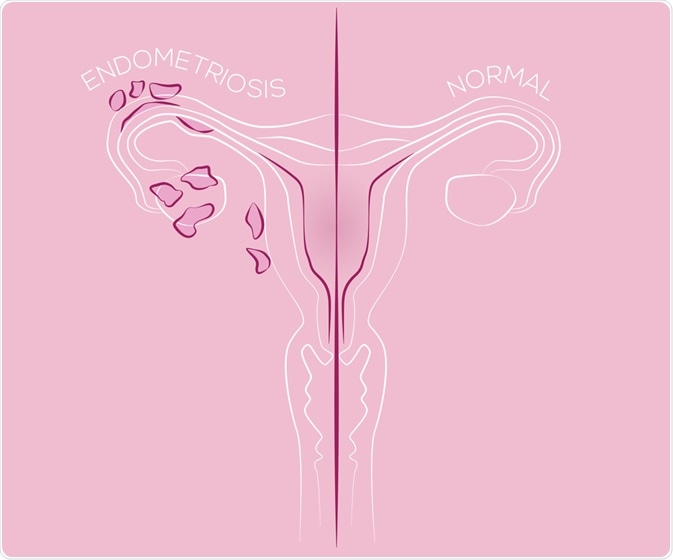What is Endometriosis?
Endometriosis is a condition defined by the presence of endometrial glands and stroma in areas outside of the uterus, typically in the ovaries, peritoneum, and the rectovaginal septum. At the beginning of the follicular phase of the menstrual cycle, these cells react similarly to those within the womb.

Endometriosis. Image Credit: Ok Sotnikova/Shutterstock.com
In anticipation of fertilization, the cells become thick with the nutrients and fluids necessary to nourish an embryo. If fertilization does not occur, the cells are shed as menstrual bleeding. In endometriosis, these cells cannot be shed via the vaginal canal, causing inflammation, and scarring of the surrounding tissues.
Symptoms of endometriosis vary in intensity and do not correlate with the extent of inflammation and scarring: some women with endometriosis do not experience any symptoms, whilst others experience significant pain. Classical symptoms of the condition include:
- Pain symptoms: This can include painful menstruation, pain during ovulation, pain during sexual intercourse, and generalized pelvic pain.
- Bleeding symptoms: These can consist of heavy periods with prolonged bleeding, irregular periods, bleeding between periods, and losing darker blood before menstruation.
- Bowel and bladder symptoms: Typical symptoms include irritable bowel syndrome, pain passing urine, painful bowel movements, or bleeding from the bowel.
- Mental symptoms: Endometriosis is often accompanied by fatigue, depression, and difficulties with concentration.
What causes endometriosis?
Currently, there is no conclusive etiology of endometriosis, although there are several hypotheses for the development of the condition. These include:
- Retrograde menstruation: Occurring when uterine tissues and menstrual blood flows through the fallopian tubes into the peritoneal cavity, this was an early theory of endometriosis that prevailed for decades. Later research showed that retrograde menstruation is experienced by most women, whilst few develop endometriosis, meaning the theory cannot account for the condition alone.
- Immune dysfunction: A normally functioning immune system can clear endometrial cells from ectopic sites, suggesting that women with endometriosis may have reduced immunity to the condition. Women with the disorder are also more likely to have reduced immunity to other conditions and increase inflammatory markers in peritoneal fluid. However, it is not clear whether these markers cause, or are caused by endometriosis.
- Vascular endothelial growth factor (VEGF): This theory is based on the finding that women with more severe endometriosis have an increased concentration of VEGF. This is a signal protein that stimulates the formation of blood vessels, leading to the characteristic hypervascularization observed in endometriosis.
Prevalence and diagnosis
Although the exact prevalence of endometriosis is unknown, population estimations place it between 2% and 10% of women, and as high as 50% in women with infertility. Globally, endometriosis affects approximately 176 million women and is the second most common gynecological condition after fibroids.
Despite this, it takes an average of eight years from the onset of symptoms to receive a diagnosis. This is due, in part, to the clinical challenge posed by a lack of non-invasive diagnostic techniques. Owing to the low correlation between symptoms such as tissue scarring and disease burden, techniques such as ultrasound are non-effective, and a reliable test for blood biomarkers for the condition is yet to be evaluated.
The current gold standard is via laparoscopy, a surgical procedure that is recommended only in the event of failed therapeutic intervention for chronic pelvic pain.
The impact of delayed diagnosis
Wellbeing
According to a survey of over 10,000 women conducted in the United Kingdom, 95% of respondents reported that endometriosis had a negative impact on their wellbeing, and 89% felt it had affected their daily functioning, and 83% reported feeling worried about the impact the condition may have on their future life.
Feelings of hopelessness and depression were also very high, and half felt it had impacted their social relationships. Given the endometriosis symptoms include chronic pain, pain during sexual intercourse, and fertility concerns, the impact that delaying diagnosis, and therefore access to evidence-based treatments is severe.
Economic impact
A recently completed large-scale retrospective analysis of clinical data in the US investigated the symptom burden and healthcare costs of delayed diagnosis. It divided women into three groups: short delay who were diagnosed within 12 months of symptom onset, intermediate delay for whom diagnosis took 1-3 years, and a long delay group who waited 3-5 years.
The results showed that pelvic pain and the likelihood of comorbidity were significantly correlated with increasing diagnostic delay. Additionally, the women in the long delay group were significantly more likely to use emergency services for endometriosis symptoms and had significantly more hospital visits and higher pharmacy costs.
Recommendations for healthcare practice
Strategies to mitigate the negative social, psychological, and economic impact of endometriosis should include:
- Improving the education of healthcare professionals to increase awareness of the clinical features of endometriosis.
- Increasing women’s awareness of the condition and destigmatizing menstrual irregularities.
- Providing holistic post-diagnostic support, including emotional, social, and psychosexual support.
References
- Burney, R. O., & Giudice, L. C. (2012). Pathogenesis and pathophysiology of endometriosis. Fertility and sterility, 98(3), 511–519. https://doi.org/10.1016/j.fertnstert.2012.06.029
- Husby, G. K., Haugen, R. S., & Moen, M. H. (2003). Diagnostic delay in women with pain and endometriosis. Acta obstetricia et Gynecologica Scandinavica, 82(7), 649–653. https://doi.org/10.1034/j.1600-0412.2003.00168.x
- McLaren, J., Prentice, A., Charnock-Jones, D. S., & Smith, S. K. (1996). Vascular endothelial growth factor (VEGF) concentrations are elevated in peritoneal fluid of women with endometriosis. Human reproduction (Oxford, England), 11(1), 220–223. https://doi.org/10.1093/oxfordjournals.humrep.a019023
- Parasar, P., Ozcan, P., & Terry, K. L. (2017). Endometriosis: Epidemiology, Diagnosis and Clinical Management. Current Obstetrics and gynecology reports, 6(1), 34–41. https://doi.org/10.1007/s13669-017-0187-1
- Surrey, E., Soliman, A. M., Trenz, H., Blauer-Peterson, C., & Sluis, A. (2020). Impact of Endometriosis Diagnostic Delays on Healthcare Resource Utilization and Costs. Advances in therapy, 37(3), 1087–1099. https://doi.org/10.1007/s12325-019-01215-x
Further Reading
Last Updated: Jan 17, 2022